Perseus in Logos (free!) | |
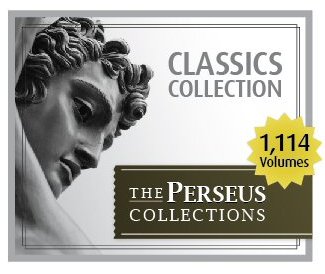
The Perseus collections: 1750 free books (1370 important for
the NT) with awesome search software from Logos.
These scholarly resources are invaluable for any contextual
word studies in the Greek Bible.
Greek background is easy to study when you have these texts
available. Hands-on working examples in this review show how to explore
the Aristotelian allusions concerning the submission of women in Timothy
and elsewhere.
My conclusion is that Logos' version of Perseus is now the
tool of first choice for studying NT Greek background. And (my repetition
expresses my amazement): they are absolutely free
|
Perseus on LogosHistorical PerspectiveInstallingWhich texts are included?Which texts are missing?Perseus texts in LogosReading textsNavigating a text windowHelp with Greek in LogosUnderstanding LatinFinding Greek vocabularyDuke Databank of PapyriLiddell & Scott LexiconCompare the Web versionConclusion |
. Perseus
Logos software is often castigated as being expensive. You
certainly can spend a lot of money on Logos software, but that's because
they have so many resources to buy. This review is mainly for something
that is free, though you can certainly add lots of other things to augment
it.
The Perseus dataset is famous among Greek scholars -
especially those studying Classics or New Testament. It contains a vast
number of Greek texts and translations which come from New Testament times
and earlier, as well as some later ones. This provides a fantastic
resource for studying the language and culture of NT times.
|
 |
.
Perseus used to be a CD. Then it turned into a website,
the latest of which is really excellent. Now it has been
incorporated into Logos and this expands its usefulness even further.
When this is linked with the Liddel
& Scott Greek Lexicon it provides a complete environment for
studying classical Greek.
|
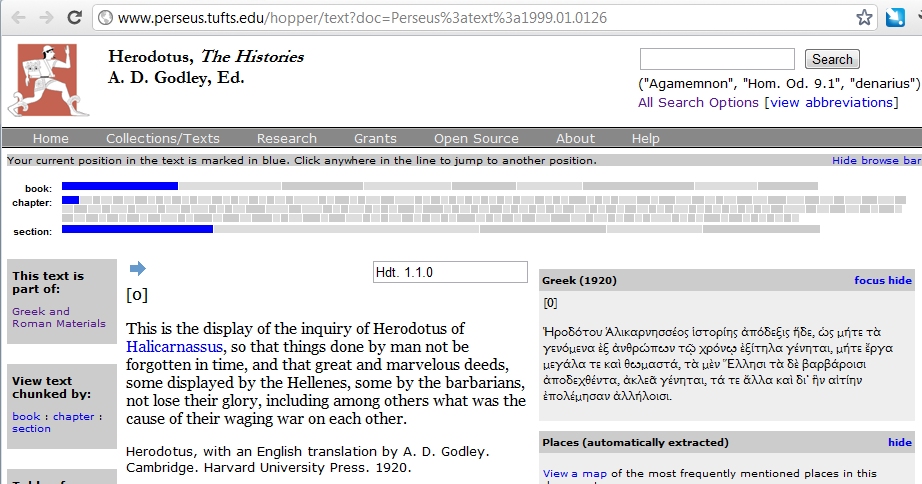 |
. Historical Perspective
My first paid work for Cambridge University was getting
Tyndale's new Ibycus computer to talk to the University mainframe. The
Ibycus was a revolutionary machine which could write in English Greek and
Hebrew. I was the geek who knew how to get incompatible computers to talk
to each other. The Ibycus was so expensive that only three units were ever
shipped to the UK, so Cambridge University had to share the one owned by
Tyndale House.
This computer could read the new collections of Greek
literature which had been typed in by specially trained Philippinos and
distributed on the brand-new format called CD. David Packard, whose firm
was a forerunner of Hewlet Packard, financed this project because he was a
keen Christian who wanted to sponsor research into the Greek of the Bible.
This project is still continuing and now virtually all Greek literature
has been transcribed, from the very beginning (about 800 BCE) till about
1500 CE and steadily onwards.This dataset is known as the TLG (Thesaurus
Linguae Graecae) and is available for annual subscription at
https://www.tlg.uci.edu/.
See more about its history here. |
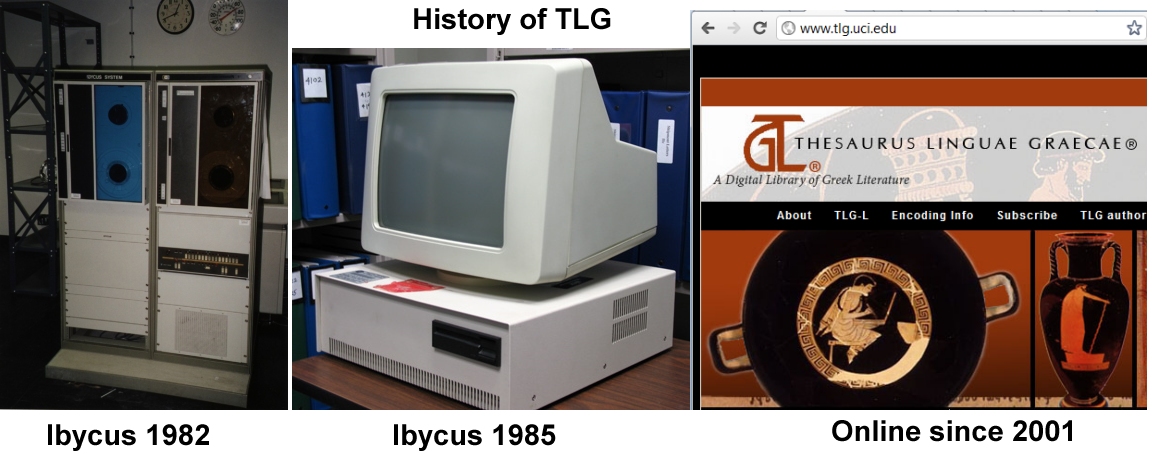
|
.
Perseus
is a free alternative, with fewer texts, but often it is more useful than
the TLG collection, mainly because most of its texts have an English
translation easily available and because it includes the major Latin works
as well as Greek. It concentrates on the early material (up to about the
3rd C CE though most is 1st C CE or earlier) because from the start it set out as a teaching tool for
Classics rather than the New Testament or Church History. However, this makes it perfect for studying the Greek Bible. It too started on CDs
and now lives on a free website at https://www.perseus.tufts.edu/hopper/.
|
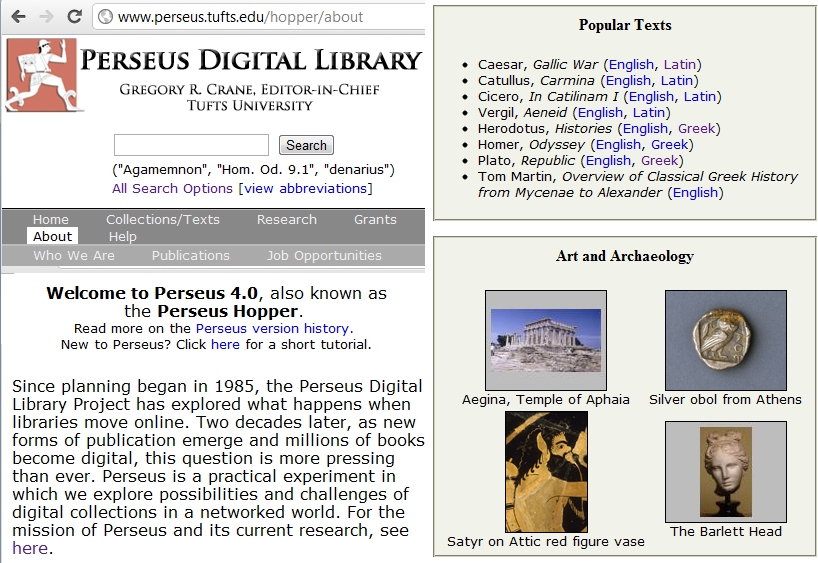 |
.
|
 |
.
Downloading the Perseus books is matter of 'purchasing' them
from their
list of free books. Warning: when you "purchase" a free book you will
have to register a debit/credit card. However, they won't take any money
from it, and you can delete the card details as soon as the 'purchase'
goes through (if you wish). You will want two titles, though you may
choose others:
* Perseus
Classics Collection (1,114 vols.)
* Duke
Databank of Documentary Papyri (256 vols.)
After you have ordered the books, re-open Logos (signing
in with the ID you registered) and the books will download automatically.
After downloading the books, be prepared to let the computer pre-indexes
for some time. This is the key to fast searches on Logos.
While you are at this page, select some other free books, especially
the Lexham
Bible (esp. useful for language studies in Logos) and the SBL
Greek testament. |
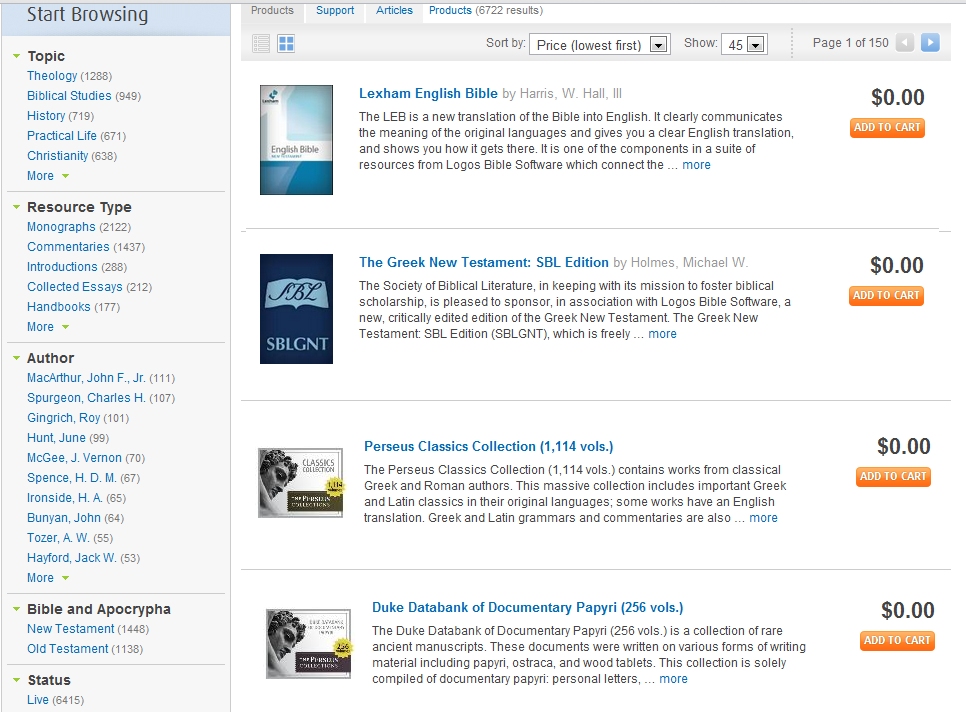 |
. Which texts are included?
Perseus consists of various collections:
* The Classics Collection (1114 vols)
The complete list of texts is impressive. Counting them is difficult - do you count "Hippocrates Collected Works" as one, or count separately each of the six works it includes?
Logos has counted 1113 separate works in the Perseus
Classics Collection, of which about 260 are in Latin, 400 are in Greek and
446 are English translations. This means that about 2/3 of the texts have
English translations available in Logos.
* Duke Databank of Documentary Papyri (256 vols.)
The number of vols for this collection is really understatement of its contents. It includes virtually all papyri which have been published. This started life as another Packard project, collaborating with Duke University and was initially published as a PHI CD, then moved to the Perseus site. It has now moved to https://papyri.info/ where it has been merged with some other papyri collections.
Other Perseus collections can also be downloaded. They
includes many interesting texts though relatively irrelevant for Biblical
Studies:
* The Rennaissance Collection:
Mainly English works from the era including Shakespeare.
* The Civil War and 19th C American Collection
Official publications and personal memoirs of the time by ordinary people.
* The Arabic Collection
A couple of English translations of the Qur'an and a couple of Arabic lexicons, including the complete 8-volume Lane's Lexicon.
I don't know why the Arabic Qur'an was omitted - you can see
it on
the Perseus site
with links to Arabic lexicons.
* Beowulf
For those who want to check up film adaptations such as "The 13th Warrior" which contains a surprising amount of real Greek and Latin.
* Richmond Times-Dispatch (6 vols.)
For those who want to know what happened in Richmond, Virginia for the past 150 years |
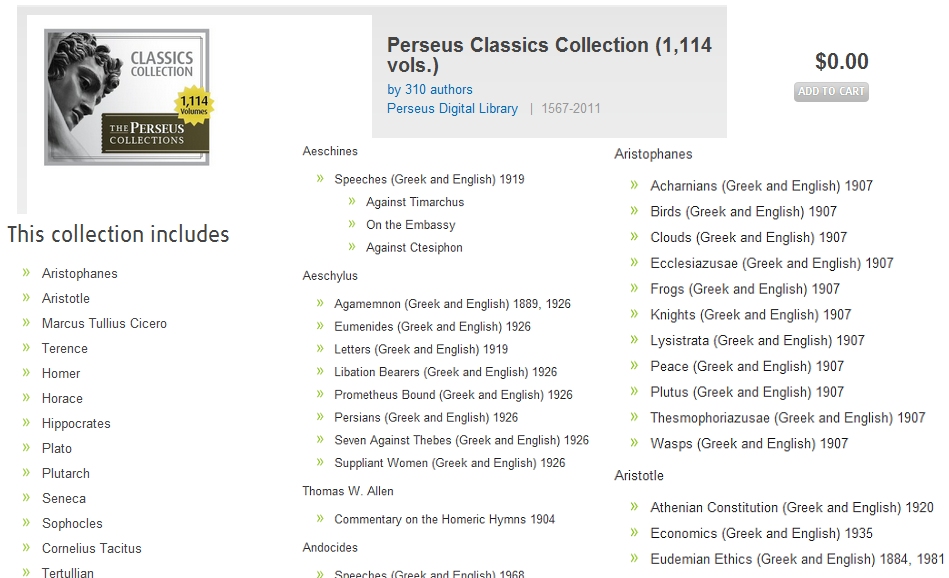 |
. Which Greek texts are missing ?
Perseus includes about 15% of all of Greek literature from
the earliest times up to the second century CE, and most of the texts have
accompanying English translations. This doesn't sound very much, but
ancient literature is huge, and this collection includes all the most
popular and important texts - though scholars differ on which are
important!
|
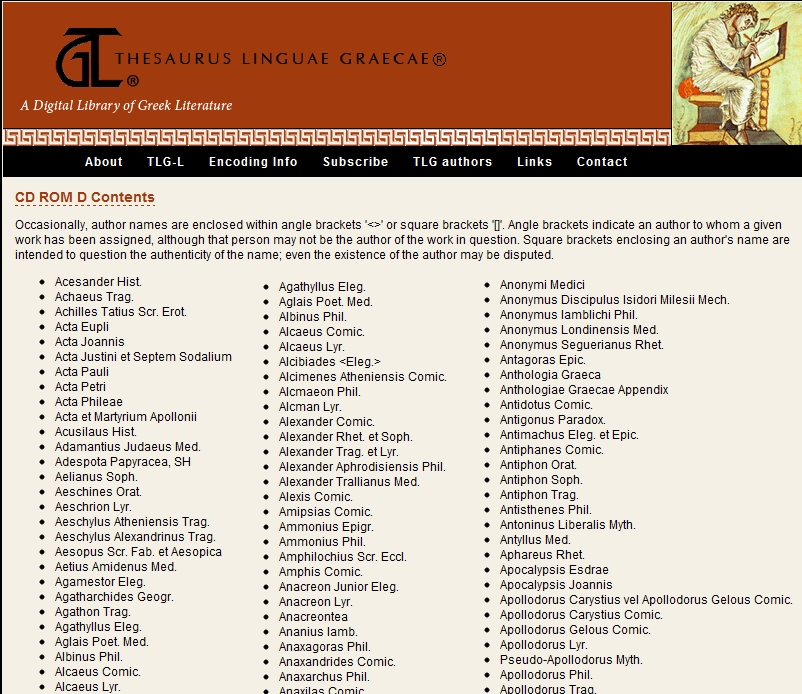 |
.
This leaves a big gap for NT scholars in the centuries
immediately preceding the NT. However, this gap is filled very well by the
Jewish Greek literature often called the Pseudepigrapha. This is available
on the web in Greek
& English,
but it is more searchable in Logos
products, and in BibleWorks or Accordance.
|
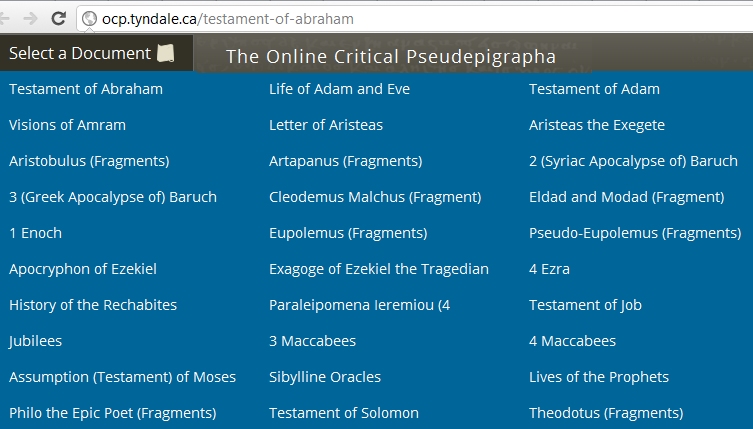 |
.Inscriptions are the only other major large area of Greek texts which is missing entirely from the Perseus collection. Fortunately there are good websites for most Greek inscriptions and most Latin inscriptions. |
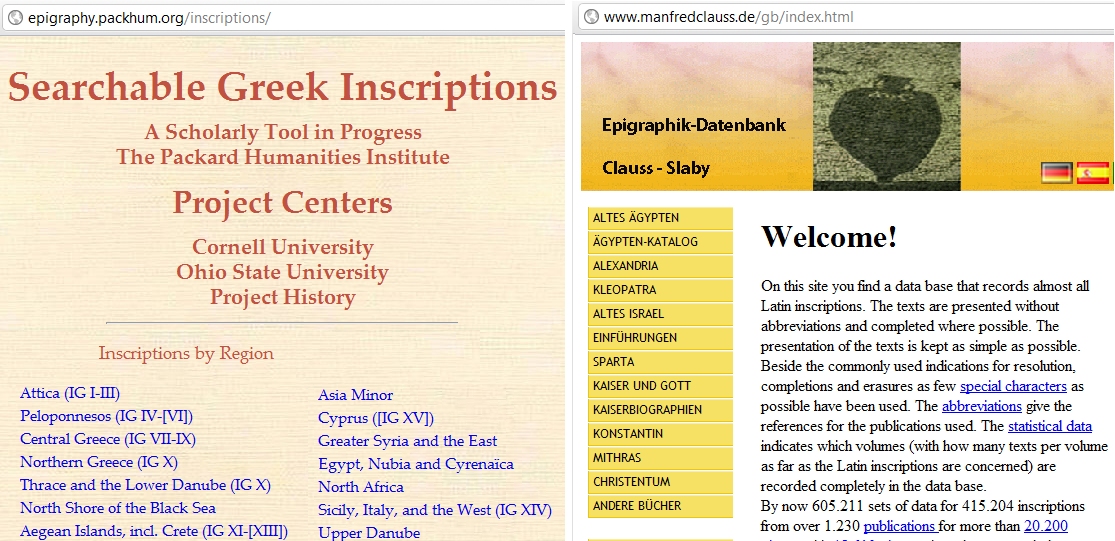 |
.
Click on the Book symbol (top left) and type "Perseus" to list all the
volumes. Disappointingly the descriptions for every volume is generic -
every volume in the Classics collection shares the same introduction. So
instead of being told that Aristotle is a 4th c BC Greek philosopher whose
work forms the foundation of Roman biological sciences and morality, we
merely hear that the Perseus Classics collection can help us understand
the language of the NT. A link to Wikipedia for each author would have
been useful, but hey, we can do that ourselves. |
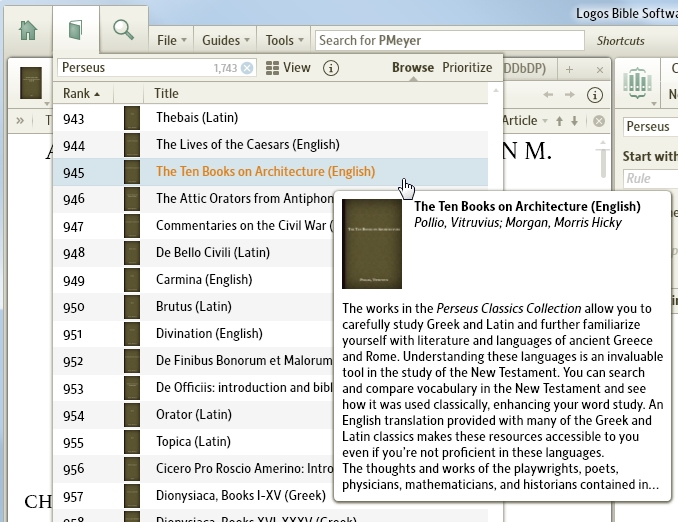 |
.
|
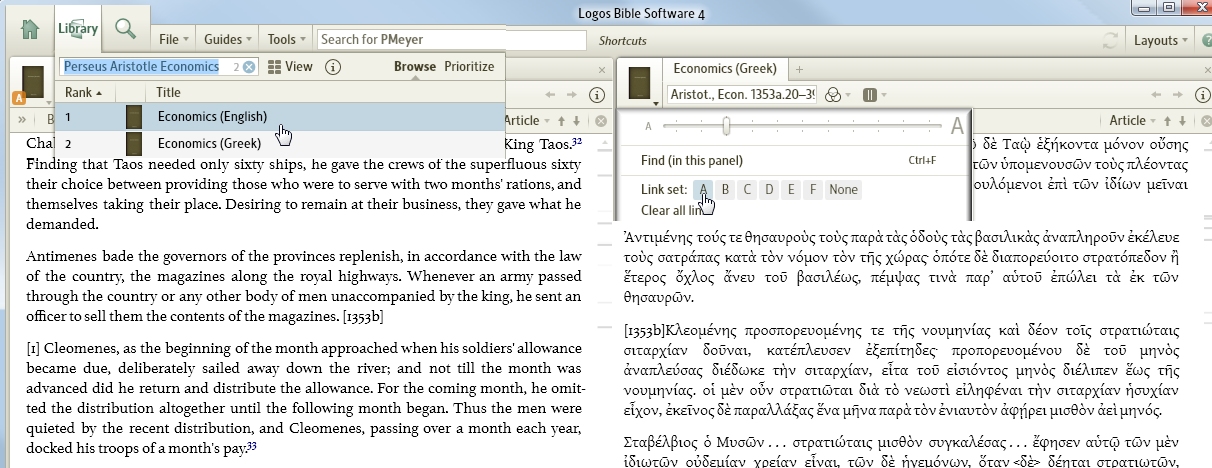 |
.
|
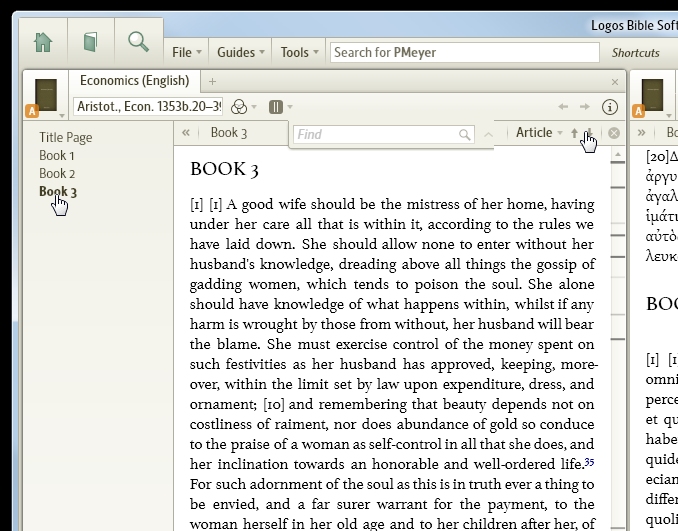 |
.
|
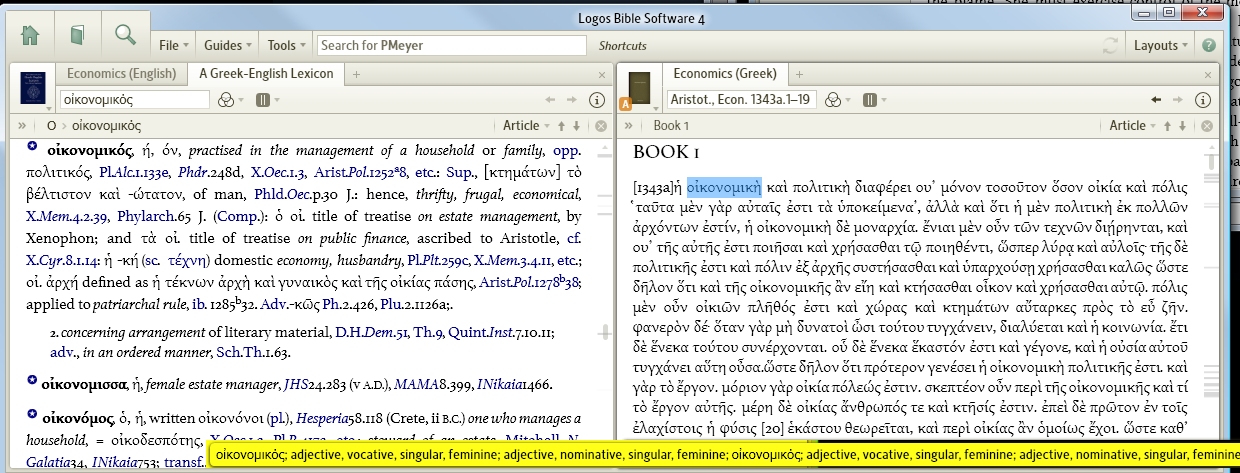 |
.
Try this:
* Go to the beginning of Aristotle's Economics in
Greek
* Double-click on the first word oikonomiké
- a lexicon opens and tells us this is "household management" which the NT is very concerned about.
* Right-click on the tab with the lexicon name
* Click on "Open in a floating window"
* Reduce the size of this window and drag it to the bottom
of the screen
- we can now see the Greek & English text, and the lexicon
* Double-click on another word, and the lexicon keeps up.
- if a second lexicon opens, it will open as a separate tab in the same floating window (very intelligent!).
* Right-click on the word and click on "Information" (bottom
right of the box)
* Click on "Settings" in the Information window and click on "Lemma
(Greek)"- this opens a box which lists basic information on-the-fly. |
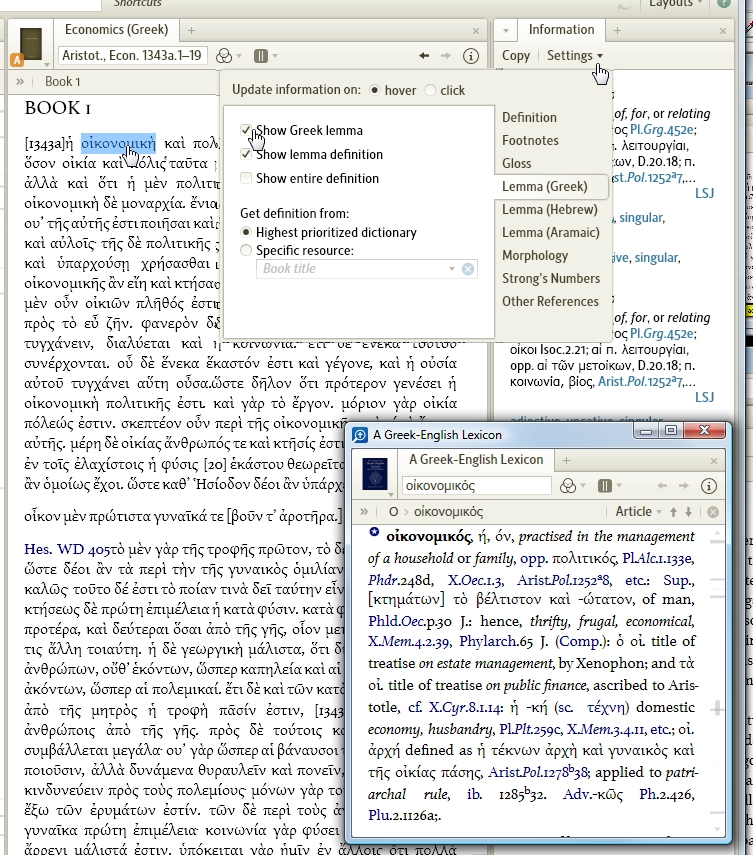 |
.
|
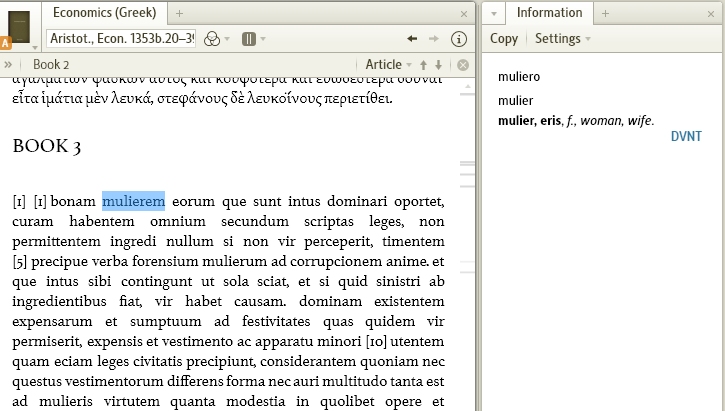 |
.
* open a Latin work - eg click on the Library (the book icon
at top left) and type "Pliny Letters"
* hover over words and the root word appears (though no
parsing, unlike for Greek)
* double-click on a word and a Latin dictionary opens at the
right place
- because this is marked as a Latin text, Logos knows how to read it. |
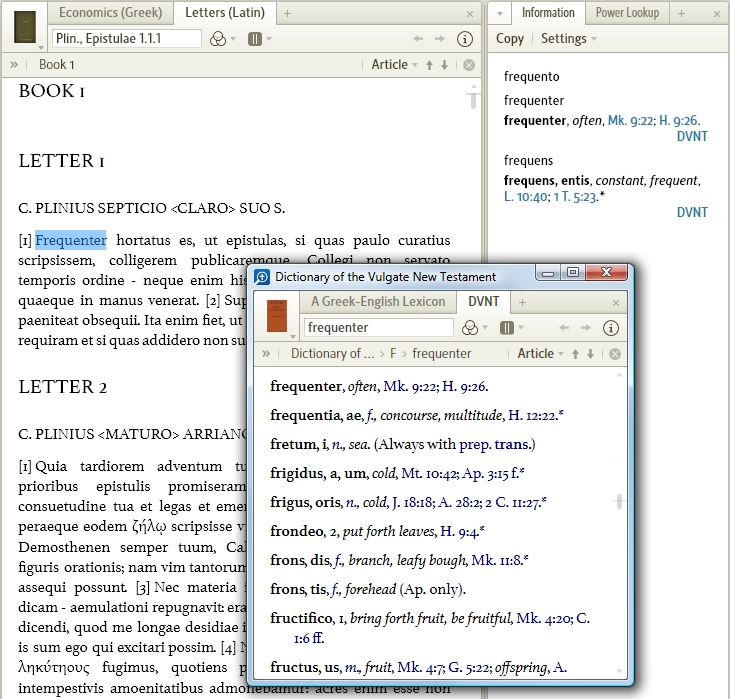 |
.
|
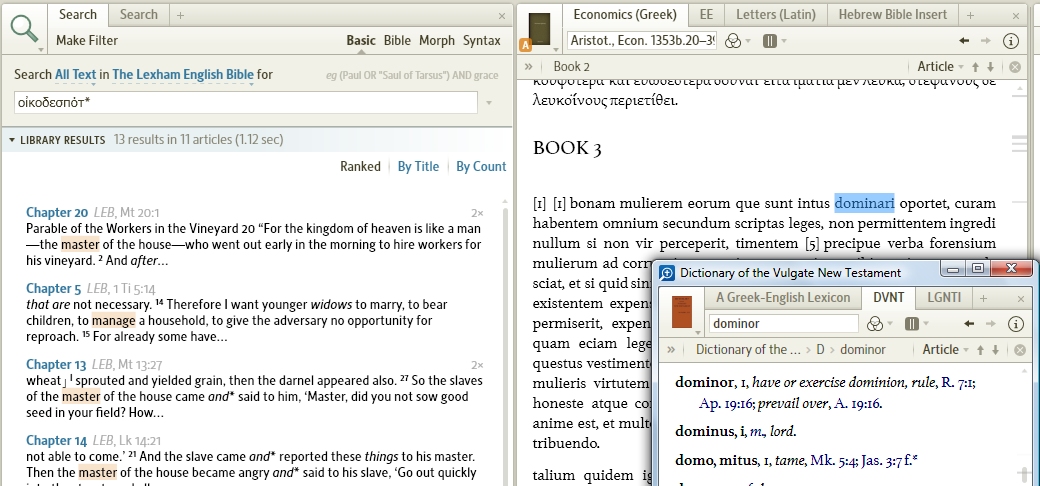 |
.
* Click on "in KJV" or "Lexham Bible" and change it to
"Perseus" and click Enter
- no results are found. This is false - there appears to be a problem here - and here is how to find the results:
* change the selection from "Perseus Classics" to "Entire
Library" - you may need to click on the (x) first
* go to the bottom of the list and click on the last number
to go to the last page of results.
* at the end are two references to Epictetus. Click on the
first to open the Greek text
* to show the English, click on the Parallels icon and pick one of the two English translations available
- you find that this passage describes the punishment of a servant who presumes to be the master of the house [I think the problem is that “Perseus” isn't defined as a collection; See instructions at https://www.logos.com/L4/training/collections] |
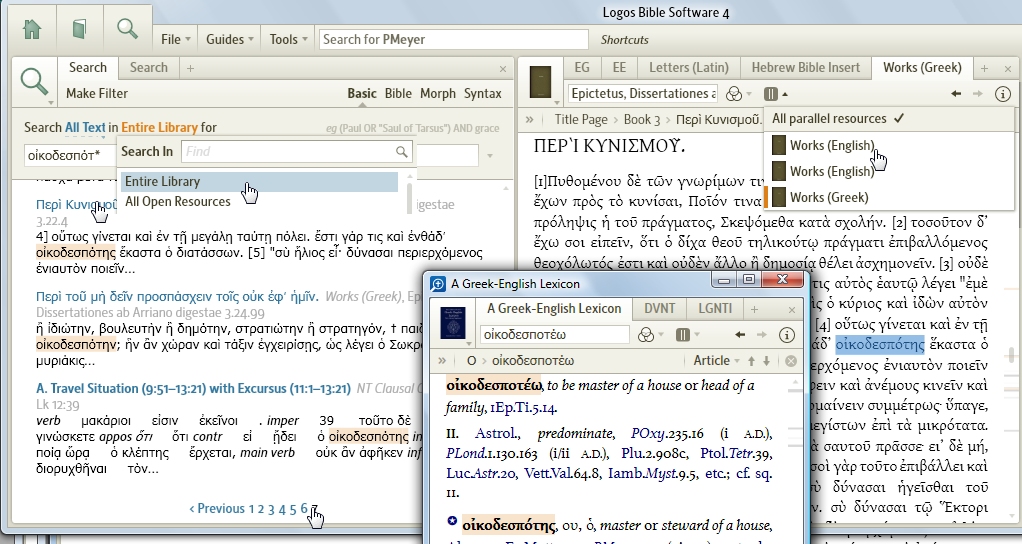 |
.
|
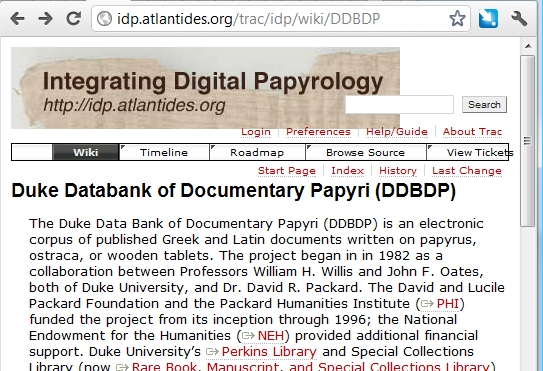 |
.
Liddell & Scott Greek-English Lexicon
This is a perfect companion for the free Perseus collection and at
about $135 a bargain (get it here). The book is a huge armful even though it is printed
on thin paper in tiny print, and the electronic version is much handier.
It is integrated wonderfully into Perseus - every reference which exists
in Perseus can be looked up at a single click. |
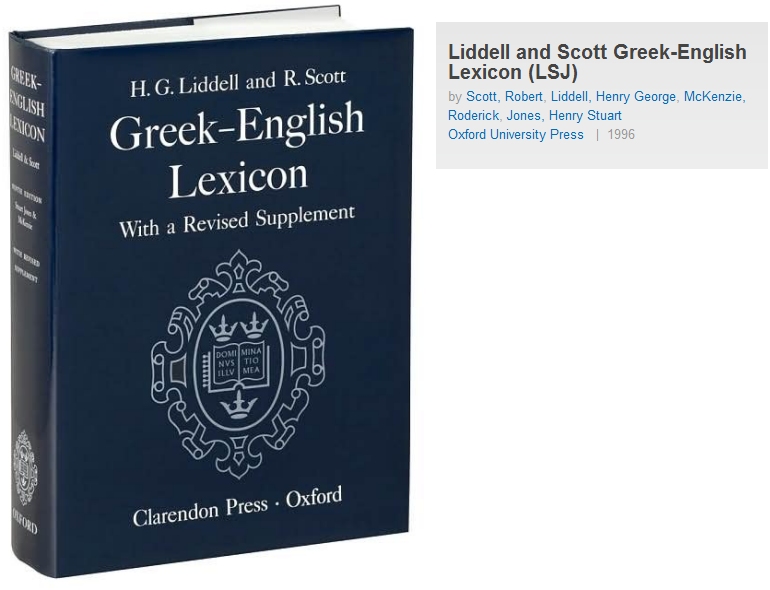 |
.
Try this:
* let's check what we have found about οἰκοδεσπότης - the master of the house * click on the Library icon and type Liddel (the following assumes you have purchased it) * type (or paste) οἰκοδεσπότης in the search box at top-left of the book * hover over "Alex" to find he is Alexander Rhetor of the 2nd C AD * double-click on "Alex" then click on "Author and Works" to see a quick summary about him * the numbers next to "Alex" are not in blue, so the work is not available, so instead: * hover over the numbers following Pl.Lg. (Plato's Laws) to see the English translation of this * double-click on it to open the book at the correct place. |
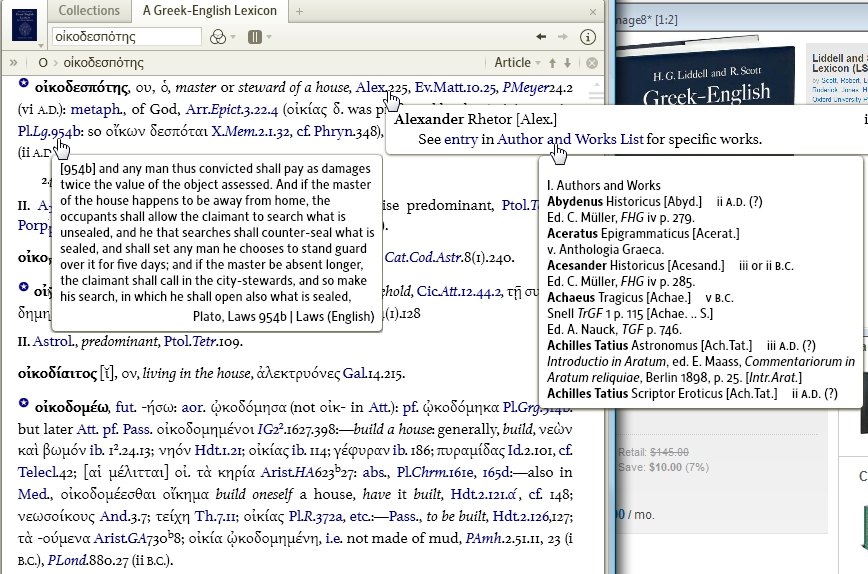 |
.
* click on the icon for Parallel versions to open up the
Greek version
|
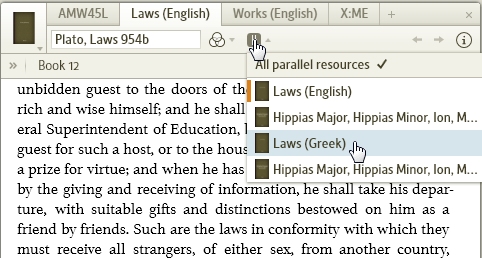 |
.
*you can see that this separates the two words as "οἰκίας
δεσπότης"
* double-click on "δεσπότης" and the definition opens up in Liddell & Scott |
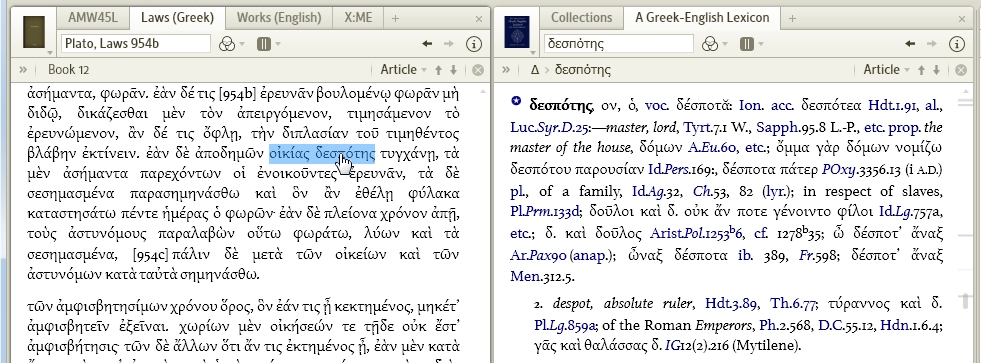 |
.
* return to οἰκοδεσπότης in Liddell & Scott (click on
the grey mark in the scroll bar indicating where you have been)
* to look up the Papyri (ie those starting with P, eg
PMeyer) we have to help Logos which calls it "P.Meyer" instead
* click on the Library icon and start typing P.Meyer. It
soon finds it in the Perseus Duke Database of Papyri.
|
 |
.
|
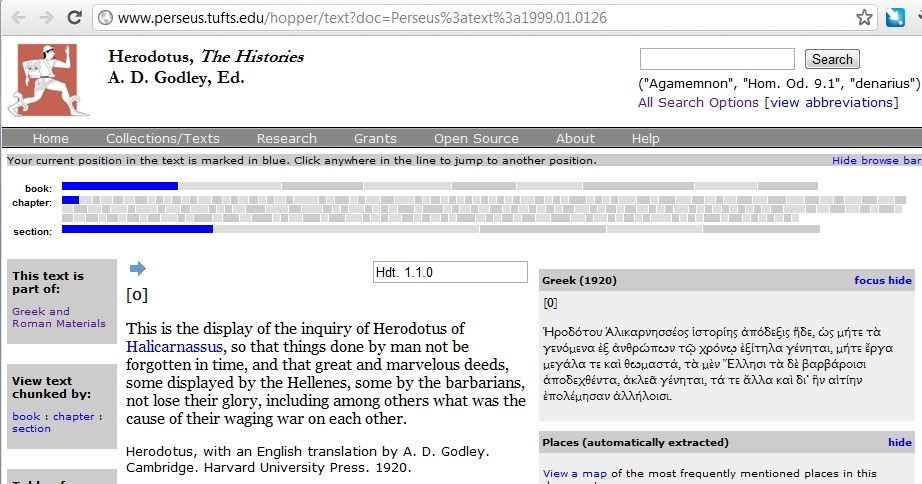 |
. Conclusion
The combination in Logos of the Perseus material and the
Duke Databank of Papyri makes this this Logos collection more useful for
NT research than any other collection of Greek literature.
Although Logos did not need to pay for these texts, I
understand that they have carried out a hugely costly development to
integrate these texts into the whole Logos library. I commend them for
this. They are carrying forward the initial vision of Packard in the way
that he envisioned, by helping all Bible scholars to study the full range
of Greek writings which illustrate the language of the Bible.
|
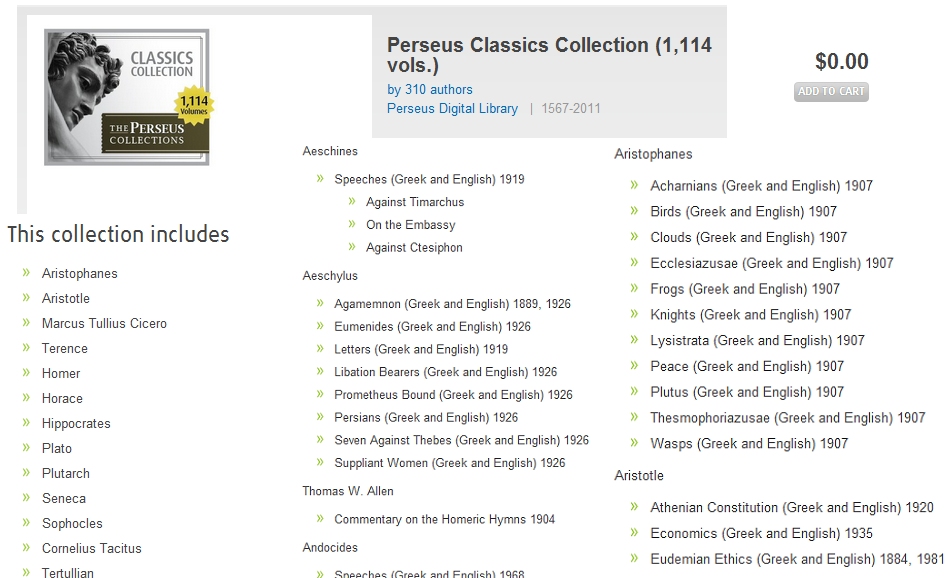 |





4 comments:
Thank you for this review and for the helpful step-by-step instructions. I have been using Logos' Perseus and DDB for a few months for my thesis and have found it extremely helpful.
Todd Price
I had downloaded this when I first saw that it was available. So far it has just set on my hard drive. Thank you for this useful information on how to use it.
Agree - this is an excellent tutorial and helps to show some of the gotchas along the way as well. Thank you!
Your post has the information that is helpful and very informative. I would like you to keep up the good work.
Post a Comment